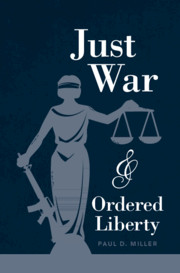Book contents
- Just War and Ordered Liberty
- Just War and Ordered Liberty
- Copyright page
- Dedication
- Epigraph
- Contents
- Acknowledgments
- 1 Thinking about War
- 2 The Augustinian Tradition
- 3 The Transition
- 4 The Westphalian Tradition
- 5 Competing Visions of a Liberal Tradition
- 6 Augustinian Liberalism
- 7 Just War and Ordered Liberty
- 8 Case Studies
- 9 Conclusion
- Works Cited
- Index
9 - Conclusion
Published online by Cambridge University Press: 08 January 2021
- Just War and Ordered Liberty
- Just War and Ordered Liberty
- Copyright page
- Dedication
- Epigraph
- Contents
- Acknowledgments
- 1 Thinking about War
- 2 The Augustinian Tradition
- 3 The Transition
- 4 The Westphalian Tradition
- 5 Competing Visions of a Liberal Tradition
- 6 Augustinian Liberalism
- 7 Just War and Ordered Liberty
- 8 Case Studies
- 9 Conclusion
- Works Cited
- Index
Summary
When is war just? What does justice require? The just war framework is an attempt to answer those questions. But there is no singular tradition and no consensus on the answers. Just war inquiry is best understood as three traditions: the Augustinian, the Westphalian, and the Liberal. Augustinians understood war to be a just response and an act of love to defend the tranquility of order when that order was violently disrupted, including exceptional cases of a disruption in other states. Justice required the restoration of a just peace. Westphalians reinterpreted sovereignty so that it was no longer understood as responsibility for the common good but as defense of international borders and the sanctity of national autonomy and independence. War was just when it was waged to defend the state from external attack and, sometimes, to preserve a balance of power and prevent any one state from amassing enough power to threaten others’ independence. Justice required the maintenance of international order and stability.
- Type
- Chapter
- Information
- Just War and Ordered Liberty , pp. 250 - 253Publisher: Cambridge University PressPrint publication year: 2021



